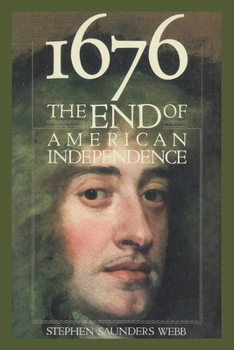1676: The End of American Independence
(Book #2 in the The Governors-General Series)
Select Format
Select Condition 
Book Overview
The colonial experience of Americans was not one long march toward independence. Sixteen hundred seventy-six was a cataclysmic year of Indian insurrection and civil war in America, when the colonies... This description may be from another edition of this product.
Format:Paperback
Language:English
ISBN:0815603614
ISBN13:9780815603610
Release Date:December 1995
Publisher:Syracuse University Press
Length:472 Pages
Weight:1.60 lbs.
Dimensions:1.1" x 6.2" x 9.3"
Customer Reviews
4 ratings
A year Americans ought to remember
Published by Thriftbooks.com User , 23 years ago
This has to be one of the most enjoyable and challenging history books I've read in many years. Extremely well documented, broad in scope, relevant to contemporary political theory, I hope this gets wide reading.On the surface, the book seeks to elevate King Phillip's War and Bacon's Revolution from historic footnotes to critical milestones. As one reads more, it becomes clear the story goal is larger. After one starts to make sense of the 1676 war and revolution, the picture of a coherent British-Iroquois imperial plan emerges. Webb makes a very strong case that the 1676 agreement between British and Iroquois, something that I had only vaguely suspected after reading accounts of the French and Indian War, wins North America for the British and thus establishes the foundation for a future United States.This is challenging version of US history and I suspect many will have a hard time including Iroquois to the list of 'founding fathers,' but the book is so well documented that everyone ought to have a good time chewing on the relevance of this very active and violent year.Webb goes into detail on four fronts: the revolutionary conflict in Virginia, the reaction in councils of King Charles II, the dynamics of Iroquois imperialism which produced Bacon's revolution and finally the negotiated resolution of British/Iroquois imperial goals. After completing the book, I felt like I knew why New York is called the Empire State. The treaty signing took place in New York.Webb uses an interesting set of English 'classes' to frame the action. The 'frontier' English (poor to middle class) are converting hunting lands into farms and fighting the local tribes they displace. In Virginia, the local tribes are allied with 'coastal' English colonists, primarily the small group of 'oligarchs' ruling the colony. The oligarchs have large fur trading incomes dependent on commerce with the tribes, so they tend to restrain the 'frontiersmen' rather than defend them. This forces the frontiersmen, led by Bacon, to rebel against the oligarchs. Meanwhile, the King of England is dependent on tobacco custom duties, the primary export of frontier farms. Thus, the British Empire tends to side with the frontiersmen and naturally suspects the oligarchs of cheating on taxes. Of course, everyone is compromised by family ties across class boundaries and the Iroquois have their own imperial agenda. It gets very interesting.
Good book
Published by Thriftbooks.com User , 24 years ago
American revolution inspired us. Book, I like
Scholarly and Bold but In the End too Scattered
Published by Thriftbooks.com User , 25 years ago
Trying to treat bold historical topics is rare amongst today's academic historians except those few who climb the ranks to a select academic elite. More vogue amongst the rank and file historian is the rigourously researched microcosm as representative of a broader historical theme. This book seems to wash somewhere between detailed scholarship of little known events and bold treatment of a historical idea and really is not ultimately effective at either goal. If I had read the draft I would have recommended that the author write three books, one each on the prime topics (or at least one each on King Phillips and Bacon's Revolt) and then a fourth (or third) book that uses the summary view of these key events as the ammunition for a bold historical assertion...that the brothers' monarchy destroyed nascent independence in the colonies and essentially cocked the gun for the revolution of a hundred years later. Together it was simply not as cogent as a single volume should be.
Spellbinding! As exotic as 'Peter Pan', but solid and real.
Published by Thriftbooks.com User , 25 years ago
This is a vivid, thoroughly researched portrayal and analysis of the colonial revolutions that DIDN'T succeed, a full century before the one that did. They're nearly forgotten today, but Bacon's Rebellion in Virginia and Maryland, King Philip's War in New England, and the deadly struggle for control of the Hudson River's highway to the fur trade moulded the destiny of England's colonies in North America.17th-century adventure themes made familiar in 'Peter Pan' jump from every page. The cast of characters includes a brash young adventurer from London who refuses to grow up, brilliant Iroquois diplomats and desperate Algonquin warriors on silent forest paths, impromptu private navies on the Chesapeake, and corrupt, aging braggarts who will stop at nothing to preserve their fading local empires. Overshadowing all of these is a swashbuckling, cash-hungry king (along with his ruthless brother the Duke of York), bent on achieving financial independence from Parliament by establishing a profitable overseas empire. The English Civil War and Cromwell's decade in power are firmly in the past and the royal brothers are fully in command in 1676, when these New World crises provoke them into military action that abruptly closes a generation of benign neglect and colonial self-rule. If you have ever been curious to find out why the Revolution of 1776 really happened, then you will enjoy this book. In the 1770s, these crushed colonists' direct descendants (who included George Washington) showed that they had learned well the bitter geopolitical lessons of the 1670s.It's not light reading, but it is compelling, memorable and satisfying. I couldn't put it down until I had finished it.






